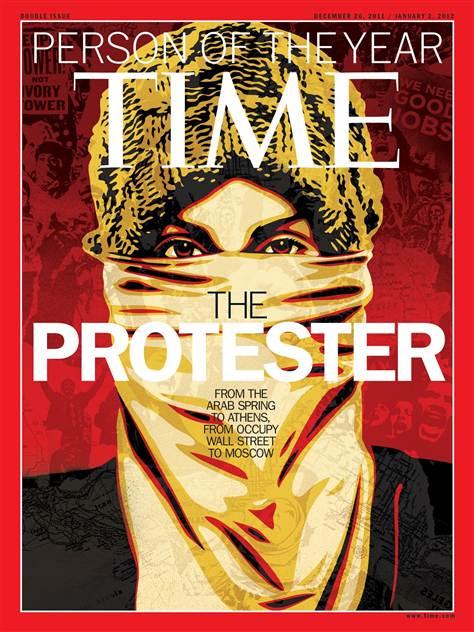‘The Protester’ named Time magazine’s Person of the Year
Time magazine’s 2011 Person of the Year is The Protester, acknowledging the power of people taking to the streets across the world.
The Time Person of the Year is out and for 2011, it’s not a particular person, it’s people: the Protester.
Each year, the news magazine tries to identify who set the tone for the year. Osama Bin Laden has held the role. So have You. But this year, as Arab capitals rock with demonstrations and American cities try to deal with the Occupy Wall Street movement, Time decided to acknowledge this as The Year of the Protester.
Nur Nur, a human rights activist in Cairo, is one of the protesters and was part of the movement that saw former Egyptian President Hosni Mubarak forced from power.
“I think it’s one of the most valid things Time magazine has done in 2011,” Nur said. “Sometimes we see the Time magazine covers and think it sensationalizes things for a Western audience.”
And while there are many individual faces of the Arab Spring protests, like Mohamed Bouazizi, a Tunisian street vendor who set himself on fire last December and really precipitated those first protests in Tunisia, Nur said this honor is best shared by all the protesters.
“It’s good to keep it very general because … by keeping it general, you’re including all the different kinds of movements around the world … not just the ones in the Arab world,” Nur said.
Jason Pottegier, part of Occupy Boston, said he initially worried that the message of the protesters — hope for change, for changing the world for the better — would be lost in this designation as the person of the year.
“It’s my wish that people can that idea of hope as what these protests are about around the world,” Pottegier said.
He said it makes a lot of sense to link protests in Tunisia, Egypt, Syria, Russia and the United States.
“There were different things that sparked the protests in different country, but in a way it had to do with opression and people being treated unfairly,” he said.
Nur pointed out that despite the similarities, protesters around the world are fighting for their own needs and have their own set of demands. In many cases, protesters even in the same country have different needs and demands.
“I hope the protester is not an attempt to group all protesters into one classification, but rather keeping it extremely general to symbolize not a protester working for certain demands, but the principle of rising up against oppression, against injustice in all of its different forms,” Nur said.
